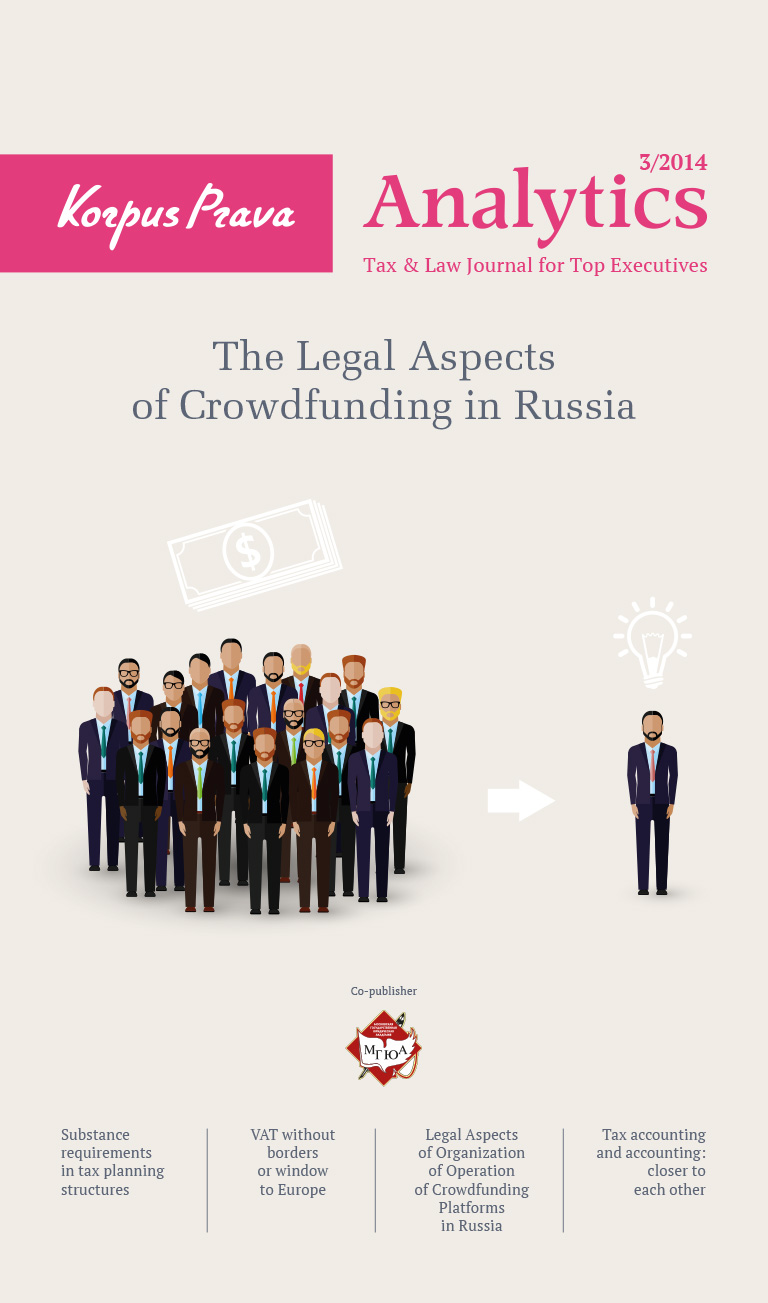- Cyprus Citizenship Scheme for Foreign Investors
- Squeezed But Pleased: Taxation of Passive Income in the European Union
- VAT Without Borders or Window to Europe
- Legal Aspects of Organization of Operation of Crowdfunding Platforms in Russia
- Substance Requirements in Tax Planning Structures
- “Deposit Splitting” of Individuals. Legal Civil and Criminal Aspects
It’s Better to Avoid Big Troubles Than Enjoy Small Benefits
The definition of the term tax advantage was given by Resolution of the Supreme Arbitration Court Plenum of the Russian Federation No. 53 On the validity estimation of tax advantages granted to taxpayers by arbitration courts (hereinafter – Plenum Resolution No. 53) dated 12.10.2006. The tax advantage is defined as the reduction of the tax burden due to tax base reductions, granted tax deductions, tax benefits, application of lower tax rates, and the granted right for tax refund (credit) or tax reimbursement from the budget.
Meanwhile, tax legislation provisions do not limit the taxpayers’ right to conduct their business transactions so that tax effects turn out to be minimal. However, in letter No. ЕД-4-9/22123@ dated 31.10.2017, the Ministry of Finance of the Russian Federation specified that the chosen deal (transaction) type should not demonstrate signs of meaningless artificiality. Besides, tax authorities shall not enforce taxpayers to choose this or that type of business transactions. Therefore, the presumption principle of taxpayer’s good faith shall remain as the crucial element of the constitutional legal regulative regime of tax relations and public order.
Therefore, it is important to delineate between tax planning, which allows taxpayers to get legal tax advantages, and ‘aggressive’ tools of tax optimization.
In letter No. ЕД-4-9/22123@ dated 31.10.2017, the Ministry of Finance of the Russian Federation states that article 54.1 of the Tax Code of the Russian Federation introduced by Law No. 163-ФЗ is aimed at the prohibition of ‘aggressive’ tools of tax optimization. By letter No. СА-4-7/16152@ dated 16.08.2017 the Federal Tax Service of Russia made tax authorities avoid formalistic approach towards the estimation of tax advantages.
Article 54.1 of the Tax Code of the Russian Federation is not a codification of regulations set out in Plenum Resolution No. 53, but a new problem-solving approach to the abuse of rights by taxpayers, which considers major aspects of the formed legal practice.
The said norm defines actual conditions, which prevent tax schemes aimed at illegal reductions of tax liabilities, including the failure to account taxable items, unlawfully claimed benefits, etc.
The main aspect of changes is as follows: the legislator specifies taxpayer’s actions qualified as the abuse of rights, and obligatory conditions for taxpayers to get an opportunity to account their expenses and claim tax deductions for conducted deals (transactions).
Thus, clause 1 article 54.1 of the Tax Code of the Russian Federation bans the reduction of the tax base and/or the payable tax by taxpayers following the misrepresentation of business activities (combination of such activities), taxable items subject to recognition in tax and/or accounting records or taxpayer’s tax returns. Typical examples of such ‘misrepresentation’ are:
- Development of a split-up business scheme aimed at the illegal application of special taxation treatments;
- Actions aimed at the artificial development of conditions for the application of lowered tax rates, tax benefits, tax exemption;
- Development of a scheme aimed at the illegal application of international double taxation agreements;
- Unrealistic terms of deal (transaction) performance by the parties (absence of its performance).
Misrepresentation of taxable items subject to qualification under clause 1 article 54.1 of the Tax Code of the Russian Federation includes:
- Failure to record income (revenue) from goods (works, services, titles) sales, including through engagement of controlled entities into business activities;
- Registration of deliberately inadequate information on taxable items in registers of tax and accounting records by a taxpayer.
Thus, in order to apply clause 1 article 54.1 of the Tax Code of the Russian Federation, tax authorities shall prove the combination of the following circumstances:
- Essence of misrepresentation (i.e. actual facts of misrepresentation);
- Causal connection between taxpayer’s actions and misrepresentation;
- Deliberate nature of taxpayer’s actions (its officials) resulting in deliberate misrepresentation of business activities (combination of such activities), taxable items subject to registration in tax and/or accounting records or taxpayer’s tax returns aiming to reduce the tax base and/or the payable tax by a taxpayer;
- Budget losses.
Deliberate nature of taxpayer’s actions may be confirmed by established facts of legal, economic and other submission to control, including mutual dependence of disputing counterparties, to a taxpayer under examination, established facts of transactions between interdependent or affiliated participants of interrelated business transactions, including via agents, using special payment methods and payment terms, and evidences of action coordination between business participants, etc.
By letter No. ЕД-4-2/13650@ dated 13.07.2017, the Ministry of Finance introduced guidance notes on substantiating evidences of willful intent in actions of taxpayer’s officials aimed at tax (levy) evasion during tax and procedural inspections.
The practice reveals the following tax evasion schemes:
- The classic tax evasion scheme is conducting fictitious deals in order to increase the cost of goods (services), increase expenditures or decrease income, i.e. selling goods at lowered cost (economically unreasonable deals). Dishonest taxpayers may conduct fictitious deals either with a short-lived company or an affiliated company.
- Splitting-up business in order to apply special taxation treatments.
In order to minimize tax burdens, numerous taxpayers split their activities subject to certain limitations, which hinder their transfer to a simplified tax system, into several smaller ones, which are covered by a simplified tax system or a tax system introducing the single tax on imputed income for certain types of activities. For example, one large shop is divided into separate departments of less than 150 m2. Department heads are registered as entrepreneurs, and they process their sales through the single tax on imputed income, sale goods by getting their trading space in rent and entering into a surety agreement, for instance.
- Unjustifiable application of tax benefits, lowered tax rates.
Thus, a taxpayer and other companies forming group A developed a relationship scheme on production asset leasing according thereto buildings, constructions, land plots, machinery and equipment required for car production are owned by a resident of the special economic zone, which pays 0% profit tax. LLC B was created as a single controlled asset centre in order to accumulate significant funds in the form of rentals on the accounts of this company for their further abroad withdrawal in the form of dividends. Such structure of financial and operational activities provided lessees with an opportunity to recognize oversized rental charges as part of profit tax expenses and minimize tax revenues.
- Substitution of civil law relations in order to gain tax advantages.
In order to reduce the tax base, many taxpayers substitute certain legal relations with others in their documents, therefore, during inspections, tax authorities are recommended to analyze agreement terms applying two integrated and interdependent procedures: analysis pursuant to civil and tax legal provisions by disclosing a real deal based on actual facts.
The practice provides other tax evasion schemes by inaction, for example, deliberate failure to specify adjustment invoices when getting discounts from a supplier for reaching premium purchase limits, which are proved by comparing taxpayer’s and supplier’s tax returns, checking incoming correspondence, and questioning of accounting department employees.
Having regard to the above, one may say that tax authorities’ work will be less formal and much more oriented on the essence (subject) and feasibility of the taxpayer’s business. On the one hand, it has certain advantages, as one may expect the number of formal claims to drop; however, it is difficult to predict tax inspectors’ line of reasoning, as the Tax Code has no interpretation of the term unreasonable tax advantage. General guidelines for tax authorities in more details may be found in letter of the Ministry of Finance No. EД-4-2/13650@ dated 13.07.2017.
Your subscription to our journal will definitely boost the efficiency of your specialists and downsize your expenses for consultants.
The journal is available free of charge in the electronic version.
Free Download

